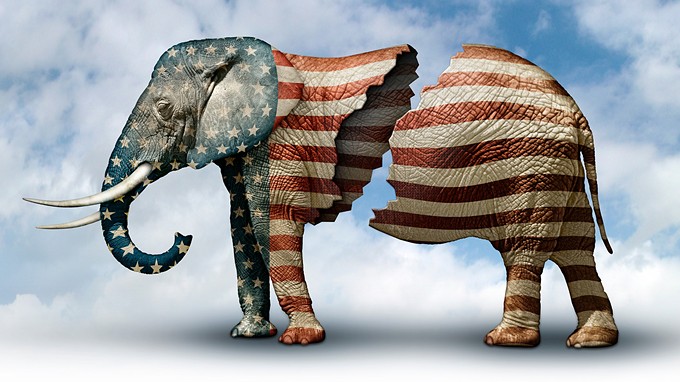If you’re able to remember the 1950s, bless your still-beating heart. The Republicans back then were solid, family-oriented folks. The dad on “Leave It to Beaver” was probably a Republican. They cared about fiscal issues and defense, but they weren’t obsessive about things and there weren’t any firebrands.
The leader of their party was the grandfatherly Dwight Eisenhower, who basically fell into politics after having led Allied forces to victory in Europe in World War II. It was pretty much guaranteed that he would win the election in 1952, but it was a coin toss as to whether he would do so as a Republican or a Democrat.
It should be noted that it was the Republicans in Congress who provided the votes for the Civil Rights Act of 1957, the first civil rights legislation passed by Congress since 1875. There were two factions of the Democratic Party back then — the northern liberal bloc that still exists today, in one form or another, and the Dixiecrat racist bloc made up of people who called themselves Democrats simply because Abraham Lincoln had been a Republican. Yes, those “Lost Cause” knuckleheads were still holding onto that grudge (that the “right” to own other human beings had been taken away from their ancestors) after nearly a century.
Then-Senate Majority Leader Lyndon Johnson ushered the watered-down legislation through Congress. (If you ever want a quick laugh, google a photo of the “Johnson treatment,” a tactic that LBJ used to garner votes.) The bill passed the Senate with Democrats voting 29-18 in favor, while Republicans voted 46-0 in favor of passage.
Try to imagine even one current Republican senator who would vote in favor of a civil rights bill were it to come up for a vote. And while you’re at it, try to imagine Abraham Lincoln winning a Republican primary for any office, anywhere. There’s no damn way.
If you’re old enough to remember the 1960s, that most tumultuous decade of the entire 20th century, you will recall that two of the more positive things that happened were the passage of the Civil Rights Bill of 1964 and the Voting Rights Act of 1965. Pushed through by then-President Lyndon Johnson, they are probably two of the three most-important pieces of legislation (along with the 19th Amendment) of the past 100 years.
Johnson used every arrow in his quiver, but he still needed Republicans to get the bills across the finish line. Twenty-one Democrats in the Senate voted against the Civil Rights Bill, but Republicans voted 27-6 in favor. (Arizona’s Barry Goldwater voted against it. His apologists tried to concoct excuses around states’ rights, but it will forever be a black mark on his record.)
Last year, every single Republican in the Senate voted against renewing the Voting Rights Act.
(In the past, I have somewhat regrettably argued that the passage of those two pieces of legislation puts Johnson in the running for the greatest president of my lifetime. However, to make that claim, one would have to completely ignore Vietnam. That would be the ultimate example of “Other than that, Mrs. Lincoln, how did you like the play?”)
If you’re old enough to remember the 1970s, then certainly Watergate will dominate your political memory. The president back then was a scoundrel, but he didn’t sexually assault women, he didn’t cheat everyone with whom he had ever done business, and he didn’t try to overthrow the government. He was just a petty little man who knew he was going the win the presidential election of 1972 but was so insecure he had other petty little men commit crimes to help guarantee that he would win in a landslide.
As always happens, the secrets didn’t stay secret. The scheme unraveled, the media found out, and a two-year-long national nightmare unfolded. The “petty little man” did what petty little men do — he lied, and hedged, and stonewalled, and tried with ever-increasing desperation to hang onto power.
And who was it that eventually showed him the door, putting country over party (and, to a certain extent, putting party over despotic individual)? The Republicans. Members of his own party had dutifully stuck by him until the evidence of his guilt was undeniable. They endured six years of other-party rule, but then, having purged their party of the last vestiges of The Scoundrel, they were able to usher in a new era under Ronald Reagan.
In that decade, the Republicans made an attempt at immigration reform. They often stuck to conservative principles, one of the foremost of which was the dedication to the principle of local control — the smaller the government and the closer it was to the people in the community, the better.
Today, Republican-controlled state legislatures across the country are spitting on that principle by usurping power and responsibilities that have been handled by municipalities for centuries, all in the false name of “election reform.” Having found that they can’t win elections, they are trying to alter the very nature thereof.
Republicans from just a few decades ago would be aghast at the clowns who now call themselves Republicans. Today’s Republican wants nothing to do with civil rights, hates the thought of immigration reform, and is willing to tear the country apart rather than standing up to the tyrant in their midst.








